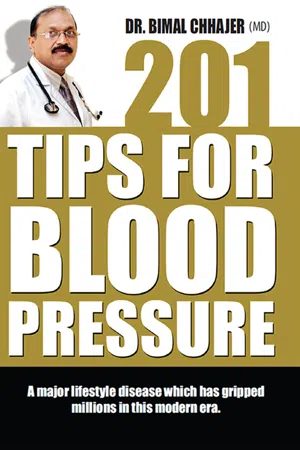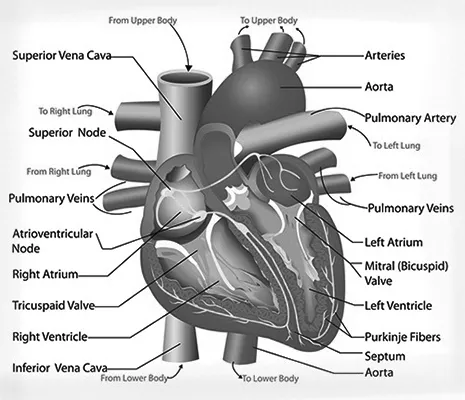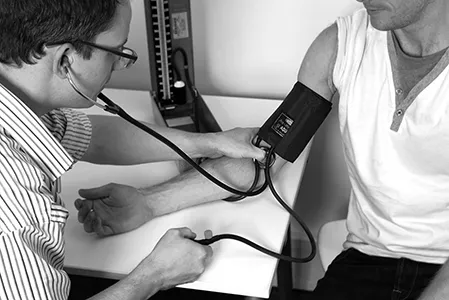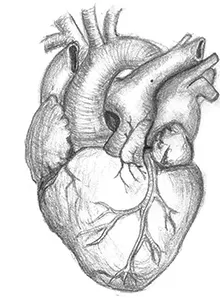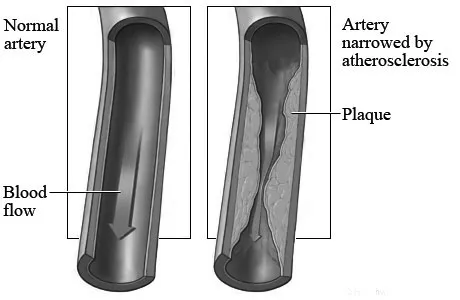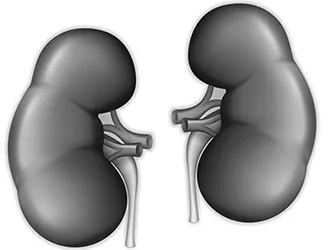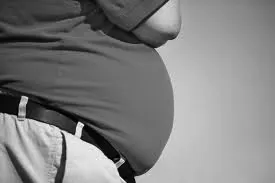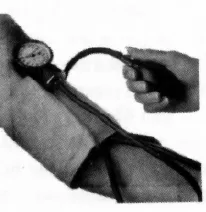![]()
Chapter - 1
Understanding Blood Pressure & Hypertension
1. WORKING OF THE CARDIOVASCULAR SYSTEM
(a) Cardiovascular System
- Working of the Cardiovascular System.
- Risk factors for High BP.
- Common knowledge about High BP.
- Types of High Blood Pressure.
Cardiovascular system includes heart, blood vessels which circulate blood to different parts of your body. Heart is divided into four chambers and with each beat of your heart a constant quantity of blood is released from heart’s fourth chamber (left ventricle) which is also known as pumping chamber of the heart. The blood is thrown into the blood vessels that spread throughout your body. The main function of the blood is to carry food to different parts of body for the proper functioning of systems in your body. Aorta, largest artery, is connected to the left ventricle and serves as the main channel for blood leaving your heart. The aorta further divides into smaller arteries, which in turn divide into even smaller arteries known as arterioles.
In our body there are very small tubes we can’t see with our naked eyes known as capillaries. These vessels can be seen with microscope and the main function of these tubes is the exchange of tiny food particles and oxygen. Oxygen and food is delivered to every cell of the body and waste products are collected back by these capillaries.
The blood from the different parts of the body is collected through other type of vessels known as veins and is sent back to the heart. From heart blood is routed to lungs, where it releases carbon dioxide and picks up oxygen. The process is known as gaseous exchange. This freshly oxygenated blood is sent back to the heart, ready to begin another journey.
(b) What is High Blood pressure or Hypertension?
Hypertension or High blood pressure is the increment of the pressure exerted by the flowing blood on the walls of the tubes(arteries) that carry the blood from the heart to every part of the body.
To understand blood pressure and the effects of it on different organs one must know the regulation of blood pressure in the body. The following information will make it easy for you to understand how high blood pressure develops and why it can be so dangerous.
(c) Need for Blood Pressure:
Any liquid flows from high pressure zone to low pressure zone. As far as the flow of blood in our body is concerned an initial pressure head has to be created. When the left ventricle of the heart pumps some blood into the already filled arterial system - a high pressure in created. This pushes blood towards the low pressure zone. So, the blood flows a little. But immediately the ventricle contracts again. So, another bout of flow occurs. The contraction goes indefinitely this way and thus establishes a continuous flow of blood throughout the body. Blood pressure is the amount of pressure exerted by blood to facilitate blood in reaching to the different parts of the body.
The pressure at the main tubes of the body when the heart (Left Ventricle) contracts is equivalent to 120 millimeter of Mercury (written as mmHg) and is called the systolic pressure. As this pressure pushes the blood away from the heart to the small arteries this pressure falls to 80 mmHg. This is called Diastolic pressure. By that time the left ventricle pumps again more blood into the system creating one more wave of higher Blood pressure. So the pressure keeps on fluctuating between 120 and 80 mmHg with every contraction and relaxation of the heart. This can be felt if you feel your pulse in the wrist. It is this pressure that keeps on moving the blood throughout our body. The work of the flowing blood is to deliver the food and oxygen to the cells of the body and come back again to the heart through tubes known as Veins to be pushed again.
All-together our arteries and veins have about 5 liters of blood at a time and with every contraction the left ventricle pushes some 70 ml of blood with a higher pressure of 120 mmHg. The next moment it again receives another 70 ml to be pushed again. This goes on and on. Without this blood pressure the flow of blood would not have happened and we would have been dead.
(d) The Organs that control Blood Pressure:
The Five major organs that help to control your blood pressure are heart, kidney, arteries, nervous system and hormones.
Heart:
Heart is a muscular organ. When these muscles contract, a force is created sufficient to eject the blood into the main artery (aorta). The harder your heart muscle has to work to release the blood, the greater the force is exerted on the arteries.
Arteries:
Arteries are blood carrying tubes from the heart to the parts of the body. Smaller arteries are called Arteriols and capillaries. These arteries are lined by smooth muscles that allow them to contract and expand as blood passes. The more elastic your arteries are, the less resistant they are to the flow of blood and less force that is exerted on their walls. When arteries loose their elasticity or become narrowed, resistance to blood flow increases and additional force is needed to push blood through the vessels. These arteries are also supplied by the nerves of the Sympathetic Nervous System. These nerves- when stimulated lead to constriction of the arteries leading to Higher Blood pressure.
Kidneys:
One of the main functions of kidneys is to maintain the volume of water at normal level and regulate the amount of sodium in the body. Water is dependent on sodium. If there is retention of sodium, it retains more water in the body. This extra fluid can overload your blood vessels and increase blood pressure. The kidneys also release some chemicals called Angiotensinogen which also has a major role to play in the control of Blood pressure. Some enzymes called ACE (Angiotensinogen Converting enzyme) help is increasing the action of these released chemicals released from the kidneys.
Nervous system:
The Nervous system which is controlled by the brain and the nerves which encircle the spinal cord (called Sympathetic Nervous system) play a major role in control of our Blood pressure. The nervous system releases neurotransmitters which can stimulate a organ called Hypothalamus which control the emotional brain. Whenever the hypothalamus is excited there is release of many hormones into the blood stream which lead to contraction of the arteries leading to high BP. The nerves also control the proteins (receptors) called alpha and beta receptors which stimulate the heart -leading to increased contraction and increases rate of the heart. This also leads to high BP.
All our stress and tensions are mediated through the brain and nervous system. So, directly or indirectly our stress or psychological pressure is translated to High BP through the nervous system.
Hormones:
Our hormones also control our BP through their action on the heart, on the arteries and nerves. The main among them is adrenaline (called Epinephrine) - which is called the stress hormone. Whenever they are secreted they lead to increased heart rate, increased contraction of the heart and squeezing of the arteries. When to cut down the stress the immediate effect is lowering of the BP. Cortisol, ACTH, Aldosterone, Thyroxine - are some of the hormones which play an important role in controlling of BP. Many new hormones and neuro hormones have been discovered by the medical science in recent days which have various effects on BP.
2. CAUSES OR RISK FACTORS FOR HIGH BLOOD PRESSURE
High BP is not caused by a single reason, but many factors together lead to increment of blood pressure. These causes are known as Risk factors for High BP. These risk factors can be divided into two major groups - Modifiable and Non Modifiable. Non modifiable causes can not be changed. But the modifiable causes are much more common and can be changed - by our own efforts.
(a) Non-modifiable risk factors :
These are the risk factors you can’t change. It means that there is no medicine to keep them in control. These risk factors are:
- Age : With age BP rises in both male and female.
- Genetic Factors: The importance of genetic factors in increasing BP has been confirmed. Studies have shown that the children of normotensive parents (BP within normal limits) have 3 per cent possibility of developing high BP, whereas this possibility is 45 per cent in children of two high BP parents.
(b) Modifiable risk factors :
These are the risk factors you can change. The factors which come in this category are:
i.) Obesity: Obesity is one of the proven risk factors for high BP. With the increase in weight the risk for developing high BP increases. Research studies have shown that when people lose their weight their BP decreases.
ii.) Fats: Increased fat intake (both Cholesterol and Triglycerides) can raise blood pressure. Increased blood level of both Cholesterol and Triglycerides also lead to atherosclerosis and this also tends to increase the blood pressure.
iii.) Alcohol: High alcohol intake is associated with an increased risk of high BP. Recent studies have shown that high systolic BP is more dangerous than high diastolic BP. It appears that alcohol raises systolic pressure more than diastolic.
iv) Physical inactivity: It increases BP indirectly by increasing body weight and other unknown methods.
v) Psychological stress : In persons with stress there is over reactivity of the sympathetic nervous system. Due to this over reactivity more adrenalin is released in the blood and there is rise in BP.
vi) Salt intake : Evidences show that high salt intake increases BP proportionally. For instance, the higher incidence of high BP is found in Japan where salt intake is more.
vii) Smoking: Smoking and tobacco intake has also been associated with high Blood Pressure.
vii) Other factors: Other factors which can raise BP are oral contraceptives, noise, vibration, temperature.
(C) Does Tension or Stress lead to Hypertension?
Does everyone at work have a say in how your job is done-except you? Does getting stuck in traffic makes you boil over, along with your radiator? Do you regularly get hot under the collar over things that other people just shrug off? If so, you’re a candidate for one of the latest medical discoveries: stress-induced hypertension.
The Stress Reaction
Whenever you are under stress, your body starts a reaction called Stress reaction. It shoots your blood up with adrenaline, which raises your blood pressure, blood sugar and heart rate. It even increases your muscle tone. Blood pressure drops slowly, until the next aggravation comes along. Too much of this and the body gives up and boosts its baseline blood pressure to a permanently higher levels.
Stress and High Blood Pressure
People who experience chronic stress are more likely to have chronically high blood pressure. How do you know if you suffer from chronic stress? It is simple: if you feel stressed out, you are. In fact, people vary widely in their reaction to stress. That’s why, those who get upset easily are more likely to have stress-induced hypertension. It is now assumed that stress in life contributes to 50% of cause of high BP.
The Power of Adrenaline
It has happened to everyone. It begins when you are startled, frightened or angry. Your heart pounds, your breath is shallow and you sweat profusely. Your intestines shut down. You feel tense...
